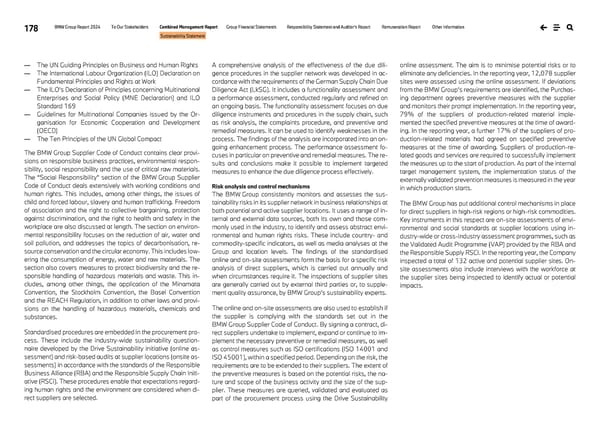178 BMW Group Report 2024 To Our Stakeholders Combined Management Report Group Financial Statements Responsibility Statement and Auditor’s Report Remuneration Report Other Information Sustainability Statement — The UN Guiding Principles on Business and Human Rights — The International Labour Organization (ILO) Declaration on Fundamental Principles and Rights at Work — The ILO’s Declaration of Principles concerning Multinational Enterprises and Social Policy (MNE Declaration) and ILO Standard 169 — Guidelines for Multinational Companies issued by the Or- ganisation for Economic Cooperation and Development (OECD) — The Ten Principles of the UN Global Compact The BMW Group Supplier Code of Conduct contains clear provi- sions on responsible business practices, environmental respon- sibility, social responsibility and the use of critical raw materials. The “Social Responsibility” section of the BMW Group Supplier Code of Conduct deals extensively with working conditions and human rights. This includes, among other things, the issues of child and forced labour, slavery and human trafficking. Freedom of association and the right to collective bargaining, protection against discrimination, and the right to health and safety in the workplace are also discussed at length. The section on environ- mental responsibility focuses on the reduction of air, water and soil pollution, and addresses the topics of decarbonisation, re- source conservation and the circular economy. This includes low- ering the consumption of energy, water and raw materials. The section also covers measures to protect biodiversity and the re- sponsible handling of hazardous materials and waste. This in- cludes, among other things, the application of the Minamata Convention, the Stockholm Convention, the Basel Convention and the REACH Regulation, in addition to other laws and provi- sions on the handling of hazardous materials, chemicals and substances. Standardised procedures are embedded in the procurement pro- cess. These include the industry-wide sustainability question- naire developed by the Drive Sustainability initiative (online as- sessment) and risk-based audits at supplier locations (onsite as- sessments) in accordance with the standards of the Responsible Business Alliance (RBA) and the Responsible Supply Chain Initi- ative (RSCI). These procedures enable that expectations regard- ing human rights and the environment are considered when di- rect suppliers are selected. A comprehensive analysis of the effectiveness of the due dili- gence procedures in the supplier network was developed in ac- cordance with the requirements of the German Supply Chain Due Diligence Act (LkSG). It includes a functionality assessment and a performance assessment, conducted regularly and refined on an ongoing basis. The functionality assessment focuses on due diligence instruments and procedures in the supply chain, such as risk analysis, the complaints procedure, and preventive and remedial measures. It can be used to identify weaknesses in the process. The findings of the analysis are incorporated into an on- going enhancement process. The performance assessment fo- cuses in particular on preventive and remedial measures. The re- sults and conclusions make it possible to implement targeted measures to enhance the due diligence process effectively. Risk analysis and control mechanisms The BMW Group consistently monitors and assesses the sus- tainability risks in its supplier network in business relationships at both potential and active supplier locations. It uses a range of in- ternal and external data sources, both its own and those com- monly used in the industry, to identify and assess abstract envi- ronmental and human rights risks. These include country- and commodity-specific indicators, as well as media analyses at the Group and location levels. The findings of the standardised online and on-site assessments form the basis for a specific risk analysis of direct suppliers, which is carried out annually and when circumstances require it. The inspections of supplier sites are generally carried out by external third parties or, to supple- ment quality assurance, by BMW Group’s sustainability experts. The online and on-site assessments are also used to establish if the supplier is complying with the standards set out in the BMW Group Supplier Code of Conduct. By signing a contract, di- rect suppliers undertake to implement, expand or continue to im- plement the necessary preventive or remedial measures, as well as control measures such as ISO certifications (ISO 14001 and ISO 45001), within a specified period. Depending on the risk, the requirements are to be extended to their suppliers. The extent of the preventive measures is based on the potential risks, the na- ture and scope of the business activity and the size of the sup- plier. These measures are queried, validated and evaluated as part of the procurement process using the Drive Sustainability online assessment. The aim is to minimise potential risks or to eliminate any deficiencies. In the reporting year, 12,078 supplier sites were assessed using the online assessment. If deviations from the BMW Group’s requirements are identified, the Purchas- ing department agrees preventive measures with the supplier and monitors their prompt implementation. In the reporting year, 79% of the suppliers of production-related material imple- mented the specified preventive measures at the time of award- ing. In the reporting year, a further 17% of the suppliers of pro- duction-related materials had agreed on specified preventive measures at the time of awarding. Suppliers of production-re- lated goods and services are required to successfully implement the measures up to the start of production. As part of the internal target management system, the implementation status of the externally validated prevention measures is measured in the year in which production starts. The BMW Group has put additional control mechanisms in place for direct suppliers in high-risk regions or high-risk commodities. Key instruments in this respect are on-site assessments of envi- ronmental and social standards at supplier locations using in- dustry-wide or cross-industry assessment programmes, such as the Validated Audit Programme (VAP) provided by the RBA and the Responsible Supply RSCI. In the reporting year, the Company inspected a total of 132 active and potential supplier sites. On- site assessments also include interviews with the workforce at the supplier sites being inspected to identify actual or potential impacts.
 BMW Group Report 2024 Page 177 Page 179
BMW Group Report 2024 Page 177 Page 179